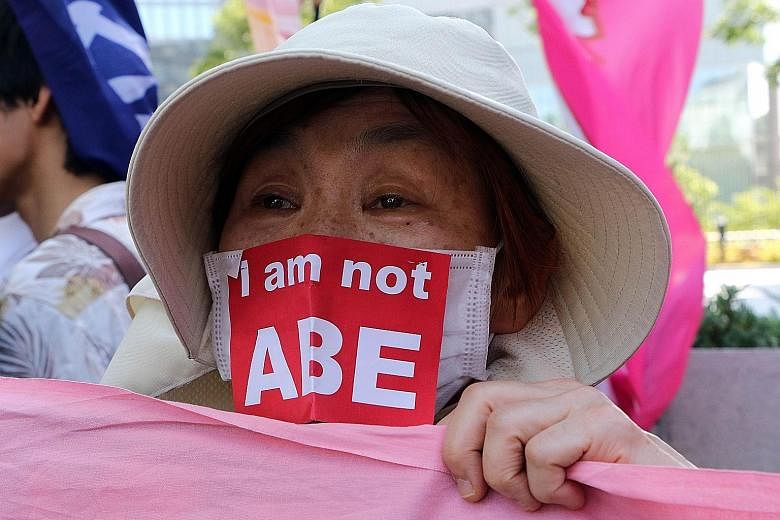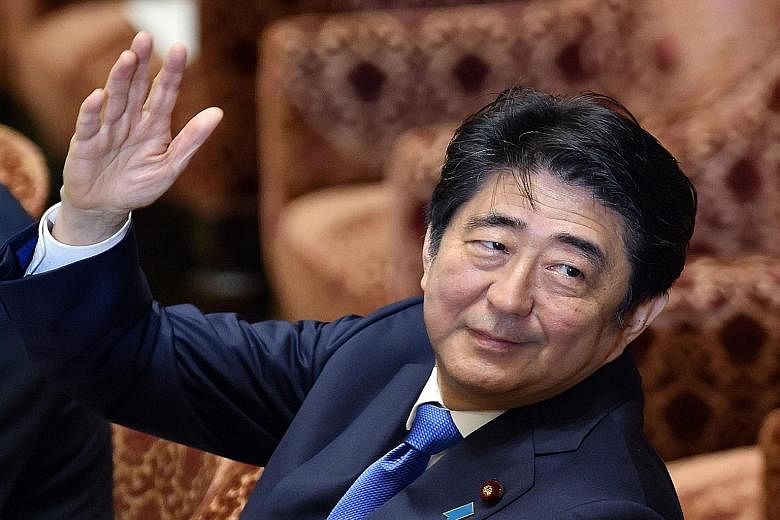TOKYO • Japanese Prime Minister Shinzo Abe's Bills to expand the role of the military will go to a Lower House vote today after weeks of debate that has eroded his support and sparked opposition protests which echo those that toppled his grandfather more than half a century ago.
The Bills were approved yesterday in a special security committee session marked by jostling, shouting and even tears from placard-holding opposition lawmakers. They chanted "nay, nay, nay" and held posters saying "No to Abe politics" and "No to a forced decision".
The Bills are all but certain to pass in the Lower House due to the ruling coalition's two-thirds majority. If the Upper House refuses to take them up, a second vote in the Lower House can pass them into law with a two-thirds majority.
The legislation enshrines in law Mr Abe's reinterpretation of the pacifist Constitution and would allow Japan to defend other countries as part of a strategy to balance a rising China.
Mr Abe's determination to ram the laws through Parliament risks a further fall in support from a public sceptical of extending the military's remit.
-
A poll done by public broadcaster NHK on July 10-12 showed Mr Abe's support fell 7 percentage points to 41 per cent. Disapproval leapt to 43 per cent from 34 per cent.this week.
In 1960, massive rallies were led by students and unions against the ratification of a security treaty with the US. The demonstrations, which sometimes turned violent, helped bring about the resignation of Mr Abe's grandfather Nobusuke Kishi as prime minister.
Mr Abe told security committee members that the legislation was needed because of changes in the power balance in both the world and the Asia-Pacific region.
"The security legislation is needed so that Japan can respond without pause," he said.
In the same session, opposition Democratic Party of Japan lawmaker Kiyomi Tsujimoto wept as she made her case against the Bills. "I can't accept the forcible passage of the Bills," she said. "The Abe administration should step down."
Unpopular changes in security policy are by no means the only challenge facing Mr Abe in the coming weeks. His handling of next month's 70th anniversary of the end of World War II risks undermining a fragile recovery in ties with China. The approaching re-start of a nuclear reactor following the 2011 Fukushima disaster is also sparking protests.
Even Mr Abe's success in winning the right to host the 2020 Olympics has recently been overshadowed by a controversy over the ballooning cost of the main stadium. Surveys show that most respondents want the design changed, while Mr Abe has said it is too late for a rethink.
A poll done by public broadcaster NHK on July 10-12 showed Mr Abe's support fell 7 percentage points to 41 per cent.
Disapproval leapt to 43 per cent from 34 per cent.
Nonetheless, none of the opposition parties has gathered substantial voter support and no potential candidates have emerged to run against Mr Abe in the LDP leadership election set for September.
BLOOMBERG, AGENCE FRANCE-PRESSE


